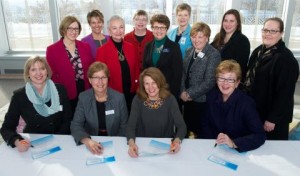Jul 16, 2014
In the States: Making BSN Education Accessible to Minnesotans in Their Home Communities
 In Minnesota, hundreds of rural nursing students will soon have a more streamlined pathway to the baccalaureate degree thanks to the persistence and foresight of nursing leaders in the state. This past year, 1,500 residents applied to a new dual-admission bachelor of science in nursing (BSN) program, a collaboration between seven community colleges and Metropolitan State University that will allow students to earn a baccalaureate degree in their home communities.
In Minnesota, hundreds of rural nursing students will soon have a more streamlined pathway to the baccalaureate degree thanks to the persistence and foresight of nursing leaders in the state. This past year, 1,500 residents applied to a new dual-admission bachelor of science in nursing (BSN) program, a collaboration between seven community colleges and Metropolitan State University that will allow students to earn a baccalaureate degree in their home communities.
The Minnesota Alliance for Nursing Education (MANE) began exploring ways to increase the number of baccalaureate-prepared nurses in the state even before the Institute of Medicine’s Future of Nursing report recommended preparing 80 percent of the nursing workforce at the baccalaureate level or higher by 2020. The report, and the subsequent formation of the Minnesota Action Coalition, gave MANE a welcome boost. The Action Coalition saw the alliance as a perfect vehicle for pursuing the Campaign’s “80 by 20” goal, and thanks to a State Implementation Program grant from the Robert Wood Johnson Foundation, the Action Coalition has provided MANE with the financial and technical resources it needs to fully develop and implement its vision of a shared, competency-based BSN curriculum.
MANE schools have now admitted their first cohort of 850 students, who will begin their nursing studies this fall.
“This gives me goose bumps,” said Lynn Johnson, MSN, RN, who has worked as director of nursing at Ridgewater College in rural Minnesota for three decades. Johnson had been looking for a way to transform nursing education at her school since 2006.
MANE’s new competency-based BSN curriculum departs dramatically from Ridgewater’s associate degree curriculum, which was built on a foundation year of practical nursing. Moving forward, the first two semesters will be devoted to general education and the next three to professional nursing to ensure students are well-prepared.
“We start with critical reasoning right off the bat,” said Johnson. “The first nursing semester, students focus on health promotion and wellness, all with well clients; the second semester is chronic and end-of-life care; and the third semester addresses acute and complex conditions.”
The final three semesters focus on baccalaureate content, including public health and global health. To promote mastery, the “spiraled” curriculum revisits most concepts each semester in a different context and at a different level of complexity.
The Action Coalition would like to see MANE expand to more community colleges and four-year institutions throughout the state, but even at its current size, MANE should have a major impact on meeting the Campaign’s80 by 20 goal. According to Faye Uppman, MS, RN, who leads the MANE project, only 35 percent of Minnesota’s nursing graduates currently earn prelicensure baccalaureate degrees.
“Associate degree programs graduate twice as many nurses,” she said, “but if even half of MANE enrollees complete the baccalaureate, we are going to shift that pendulum.”
Although students have the option of leaving the program with an associate degree after five semesters, Uppman is optimistic that most students will stay to earn a BSN.
“Our patient population needs nurses who are prepared to be thinkers in any environment, from acute care to home care to case management to telehealth nursing,” she said.
MANE’s founders also recognize the importance of increasing the diversity of the nursing workforce in Minnesota, and hope the program will help to attract more diverse students. Uppman acknowledges, however, that it is not enough simply to recruit diverse students.
“Once students are accepted, how can we best create a culture of inclusiveness and support?” she asked. That is one of the questions the Minnesota Action Coalition and MANE are working to answer.
This story appeared in the July 2014 issue of Advancing Health: News from the Campaign for Action.
